by Clive Kirkwood
Clive Kirkwood is an archival specialist in the Manuscript & Archives repository of Special Collections, UCT Libraries.
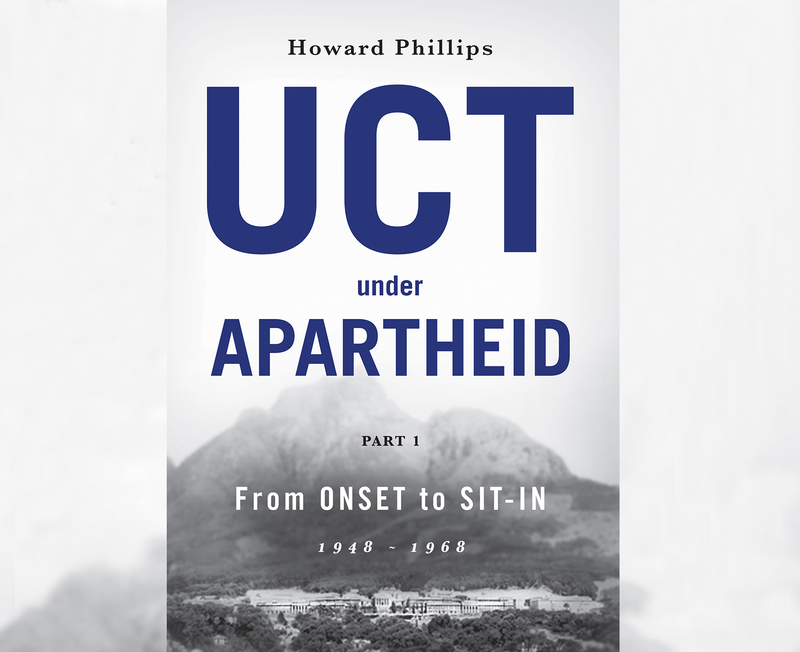
The recent publication of Emeritus Professor Howard Phillips’ second volume of a history of the University of Cape Town has brought a special satisfaction and fulfilment to the university’s archivists. As custodians of a large proportion of the archival sources on which the work is based, they were in some sense participants in the multi-year research process, identifying, retrieving and providing access to material for Prof Phillips and his research assistants. The book also promises to provide an important reference work in the future management of and provision of access to the documentary record of UCT and facilitating the answering of requests for information.
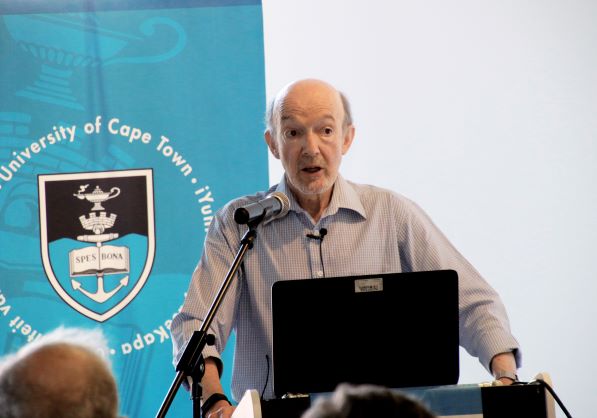
A video containing highlights of the launch of the book UCT under Apartheid, hosted by the UCT Development and Alumni Office on 12 February 2020, is accessible at the UCT alumni YouTube channel
Howard Phillips is the author of a previous history of UCT, entitled The University of Cape Town, 1918-1948: The formative years. The new work UCT under Apartheid Part I: From Onset to Sit-in covers the years 1948-1968 and is intended to be the first of two volumes ultimately covering the period up to 1994. Like his earlier magisterial work, the new history succeeds in providing a comprehensive 360 degree view of the university in all its facets, and is characterised by the thoroughness of its research, and the succinct, even-handed and candid assessment of policies, developments and individuals. It is in addition a remarkable achievement that Prof Phillips has been able to produce an authoritative reference work which yet has an accessible and engaging style making it a pleasure to read.
Prof Phillips gives generous acknowledgement to the custodians of and sources of information upon which the research was based. The core sources are UCT’s own administrative archives kept in its Meulenhof archival repository managed by Lionel Smidt, such as minutes of Council, Senate and committees; circulars and correspondence; and personal and appointment files of staff. Prof Phillips also mentions official records in public archives, and the collections of press clippings of the National Library in Cape Town and Archive for Contemporary Affairs in Bloemfontein. Another important primary source were almost 200 interviews conducted with former UCT staff and students, and these perspectives from various angles certainly supplement and provide counterpoint to the official record. Many other published and unpublished works (like theses), often held in Special Collections, were consulted, which expanded on official versions seen through particular lenses. Professional and prompt delivery of imaging services were provided by Digital Library Services. Another important source was the Government Publications unit of Special Collections headed by Laureen Rushby, such as annual reports of the Department of Education, Hansard and reports of commissions of inquiry on university affairs.
When reading the new book I was however particularly struck by the extent to which it draws on primary sources held in UCT Libraries’ Special Collections, or in which the department holds an extensive range of sources and archival collections that relate to events and individuals prominent at UCT between 1948 and 1968. As an archivist in Special Collections, who along with many others, was often responsible for providing access to archival material during this research, this was an exciting realization for me. What I aim to do here, rather than attempting an assessment of the work or describing what the work reveals about UCT’s history, is to sketch the range of these primary sources relating mainly to this period. I will use only a selection of illustrative examples from among many more relevant collections. Even though this might still result in somewhat of a dry catalogue, I found it fascinating and hope it will be of interest to others.
Primary and published sources of and about UCT
Special Collections has built up extensive holdings of published material produced by UCT itself and primary sources about the university’s functions, entities and staff. Published material includes the full runs of UCT’s annual Prospectus or Calendar, official reports and journals (including those of students) such as UCT News, Monday Paper and Varsity, and earlier iterations. There are also serials or occasional publications of departments, residences and clubs.
Primary material comprises a large subject-based collection of photographs, clippings, leaflets and ephemera about faculties, departments, units, residences and structural planning, and a related series on prominent staff members. Among the events in this period that are well documented are UCT’s commitment to academic freedom in the face of legislation on separate university education in the 1950s and staffing in the 1960s including the sit-in of 1968 over the Mafeje Affair. There is also a chronological series of newspaper reports about UCT issues in scrapbooks dating approximately 1950-2000, and other material such as citations for honorary degrees, graduation programmes and examination papers.
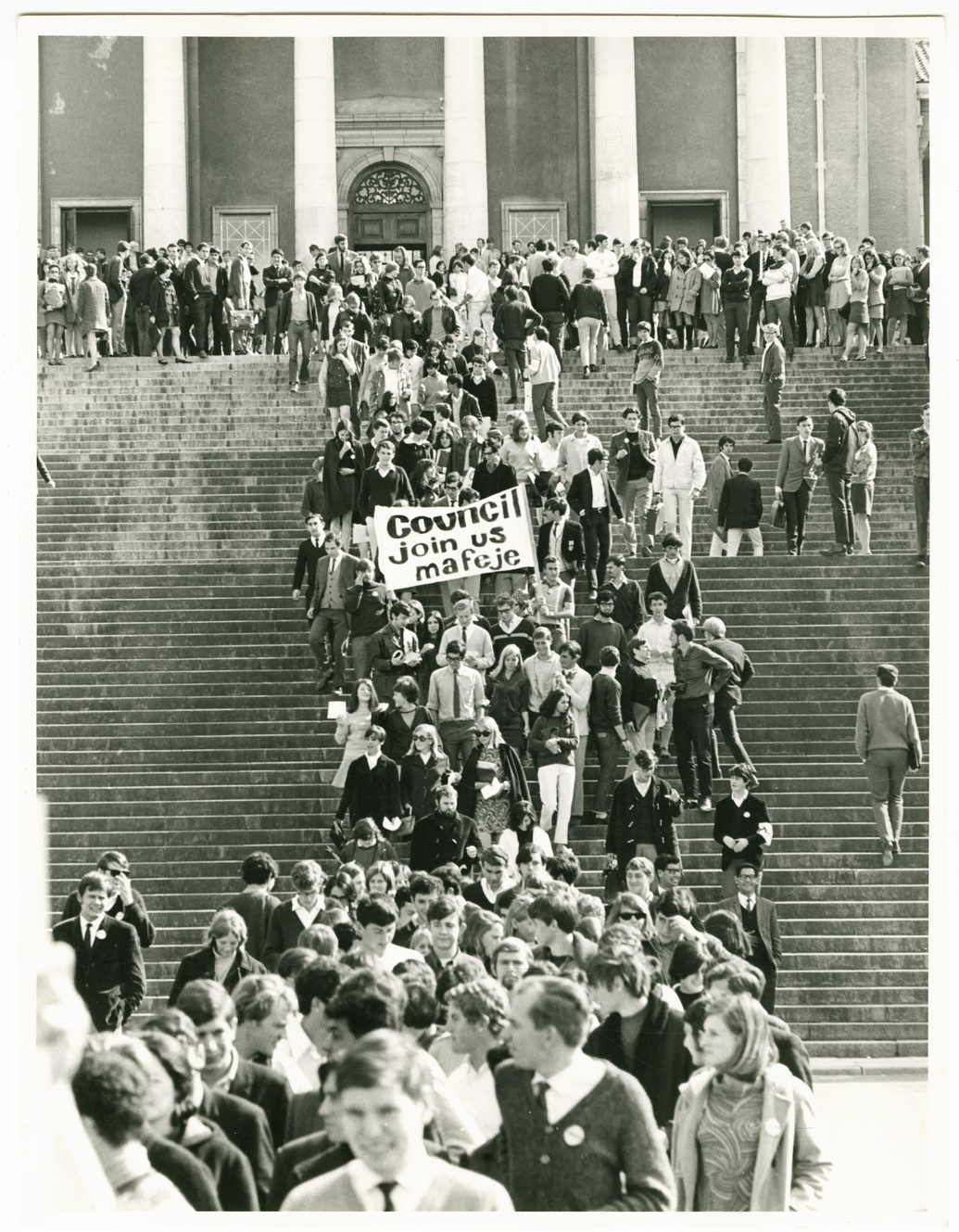
The illustrations in the book are largely drawn from these categories of sources. Indeed, Prof Phillips painstakingly combed many of these sources in a quest for striking and representative images to use as illustrations, which are a feature contributing to the engaging nature of the book. The end plates showing the campus layout in 1948 at the beginning of the book, and in 1968 at the end, were maps sourced from the UCT Calendar of the relevant years. UCT Libraries’ Digital Library Service digitized all these illustrations from sources in disparate formats to provide the excellent images which are an important aspect of the book.
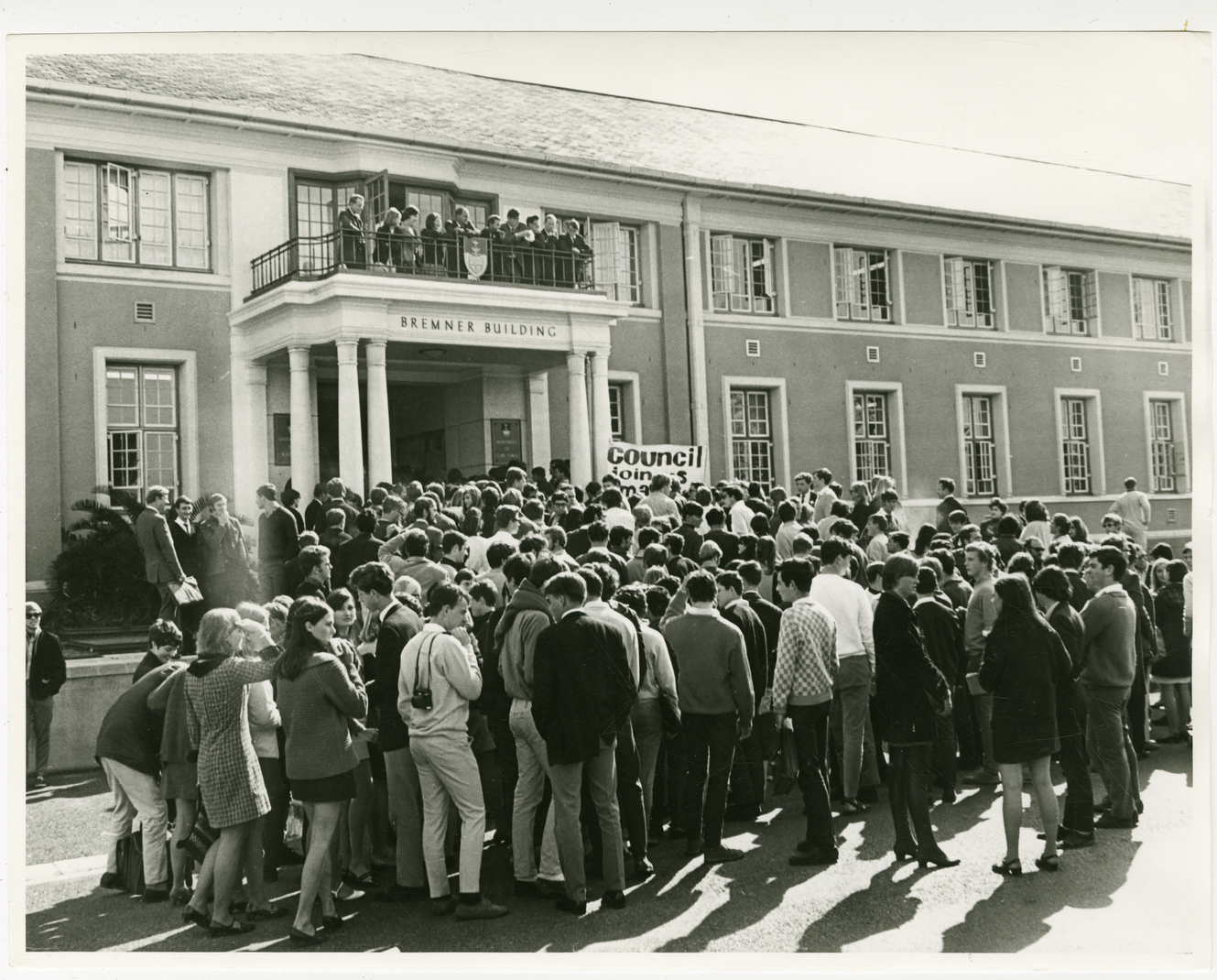
Specific archival collections of individuals and organizations
Special Collections has custody of a wide range of original archival collections, many of which relate directly to UCT, their creators either being staff, students or service providers such as architects. It is noteworthy that early in the period covered by the book, René Immelman, who was University Librarian between 1940-1970, commenced the collection of primary sources such as manuscripts and extended holdings of government publications. “Together they betokened the emergence of an additional role for the Library, that of a repository for primary research material. With collections the like of the Bleek and Lloyd Archive of Bushman Folklore and the papers of Louis Leipoldt and Olive Schreiner on its shelf thanks to Immelman’s energetic initiative and persuasive powers, UCT Library was moving beyond being just an undergraduate library to becoming a research library too” (page 229).
Administration: The running of UCT
Special Collections has in its custody the papers of the Chancellor for most of this period, Chief Justice Albert Centlivres (1950-1967). Among Chancellors, Centlivres played an unusually prominent role and was at the forefront of UCT’s opposition to the segregation of university education. His stirring public speeches and writings on the subject are included in his papers. Jan Smuts had been Chancellor until his death in 1950, and it is of interest that the arrangement and cataloguing of his papers was undertaken in this period at UCT Libraries under the supervision of a member of the Department of History, Dr Jean van der Poel. While the original material was subsequently housed at the National Archives, the microfilm version together with its catalogue remain a valued resource in Special Collections.
There are also the papers of all three Vice-Chancellors of this period, Dr TB Davie (1948-1955), Prof JP Duminy (1958-1967) and Sir Richard Luyt (1968-1980). Davie’s papers reflect his commitment to maintaining academic freedom as apartheid policy began to encroach. As an administrator rather than an academic by profession, Luyt’s papers were notably well organized and are an authoritative source for major events affecting UCT, such as the Mafeje Affair and sit-in of 1968.
Among other collections that reflect the work of UCT leaders are the papers of Deputy Vice-Chancellor Prof Donald Inskip and chair of UCT Council, William Duncan Baxter (1945-1960). (It was Baxter who in 1960 bequeathed the initial funding for UCT “to build a theatre for all Capetonians”, a project finalized in 1977.)
Physical facilities: the “Second UCT” built in this period
The post-war increase in student numbers saw an extensive building programme of some 19 new buildings erected or started on the Groote Schuur campus (and three on the Medical School campus). Prof Phillips describes this as “the building of a Second UCT” partially surrounding the original Groote Schuur campus, which had barely changed since the 1930s.
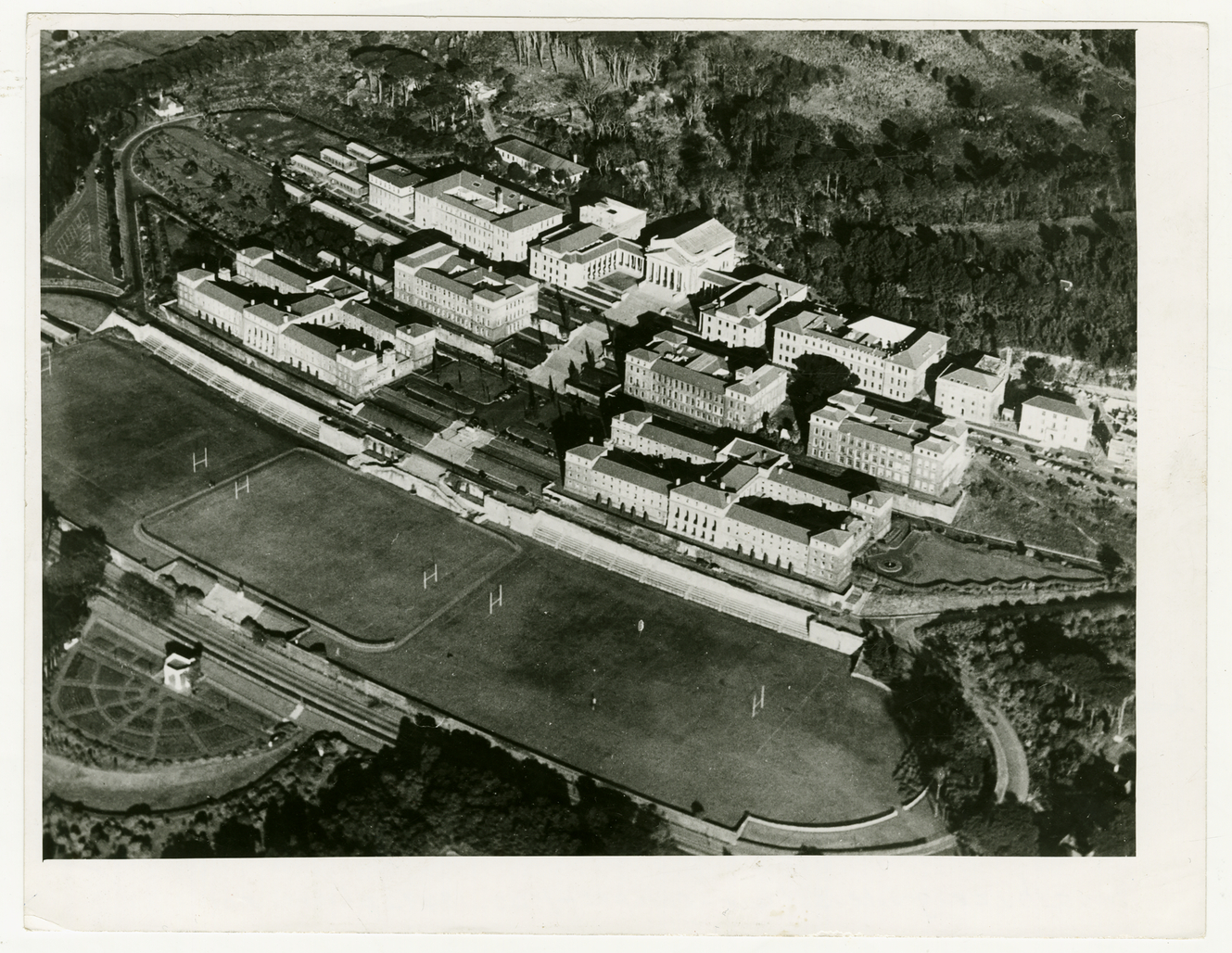
In this period the continual building works were a handicap to teaching and learning. And while the original campus was designed as a stylistically integrated whole, deviation from the original guiding principles resulted in a variegated range of new structures (and an architecturally rather inharmonious upper campus). Of the new buildings, ten were designed by UCT staff and seven by architects trained at UCT. The drawings and specifications of many of the buildings are kept in Special Collections and were received either as part of the papers of the relevant architects or via UCT’s Properties and Services. The drawings are frequently used, as architectural students are set assignments related to UCT buildings and are also needed when renovation and conservation work is done.
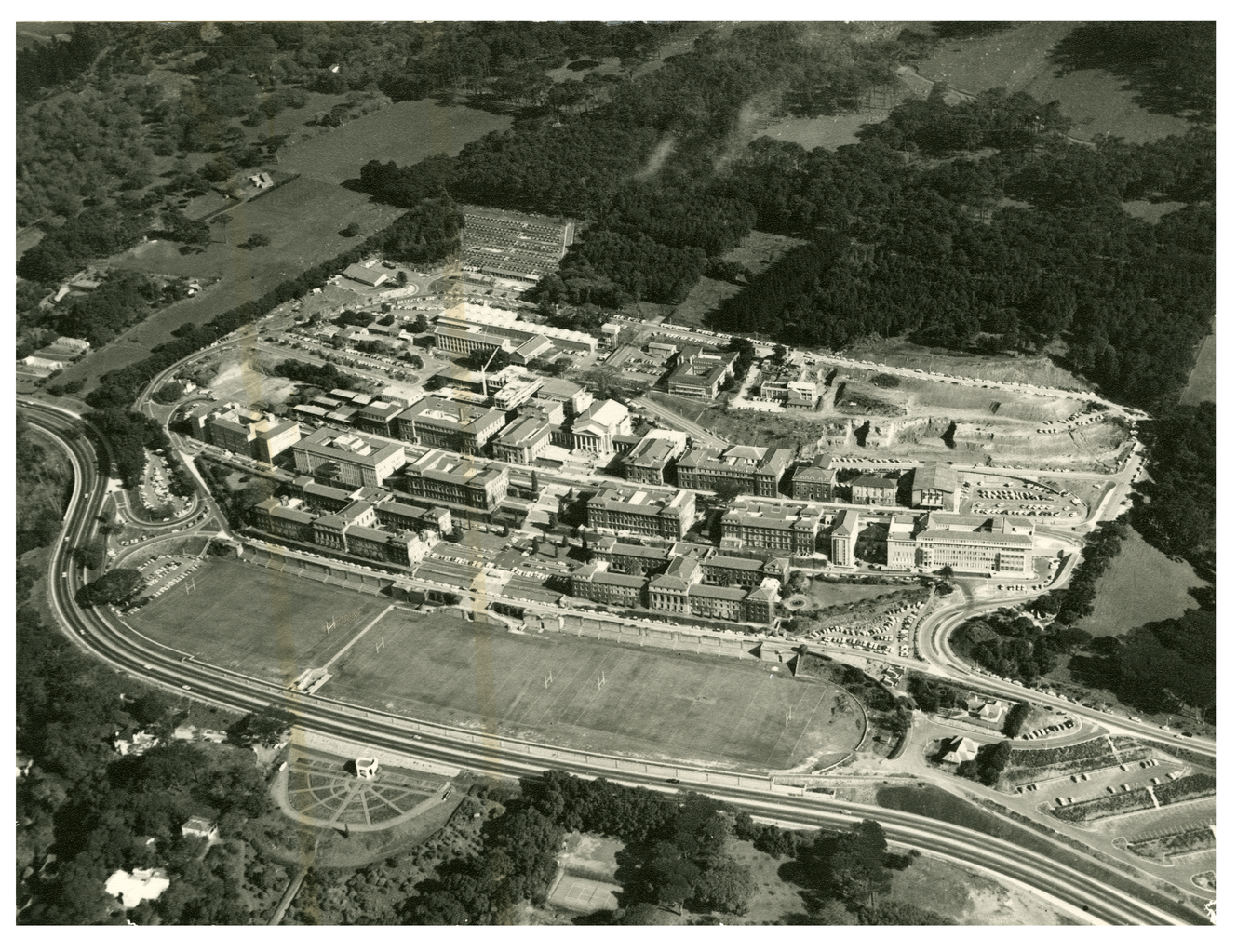
A development that significantly affected the physical structure of UCT was the widening of Rhodes Drive in 1961-1962 to create a freeway, effectively segmenting the Groote Schuur campus. The papers of City Engineer Solly Morris (1950-1975), a graduate of UCT and member of UCT Council, reflect this development.
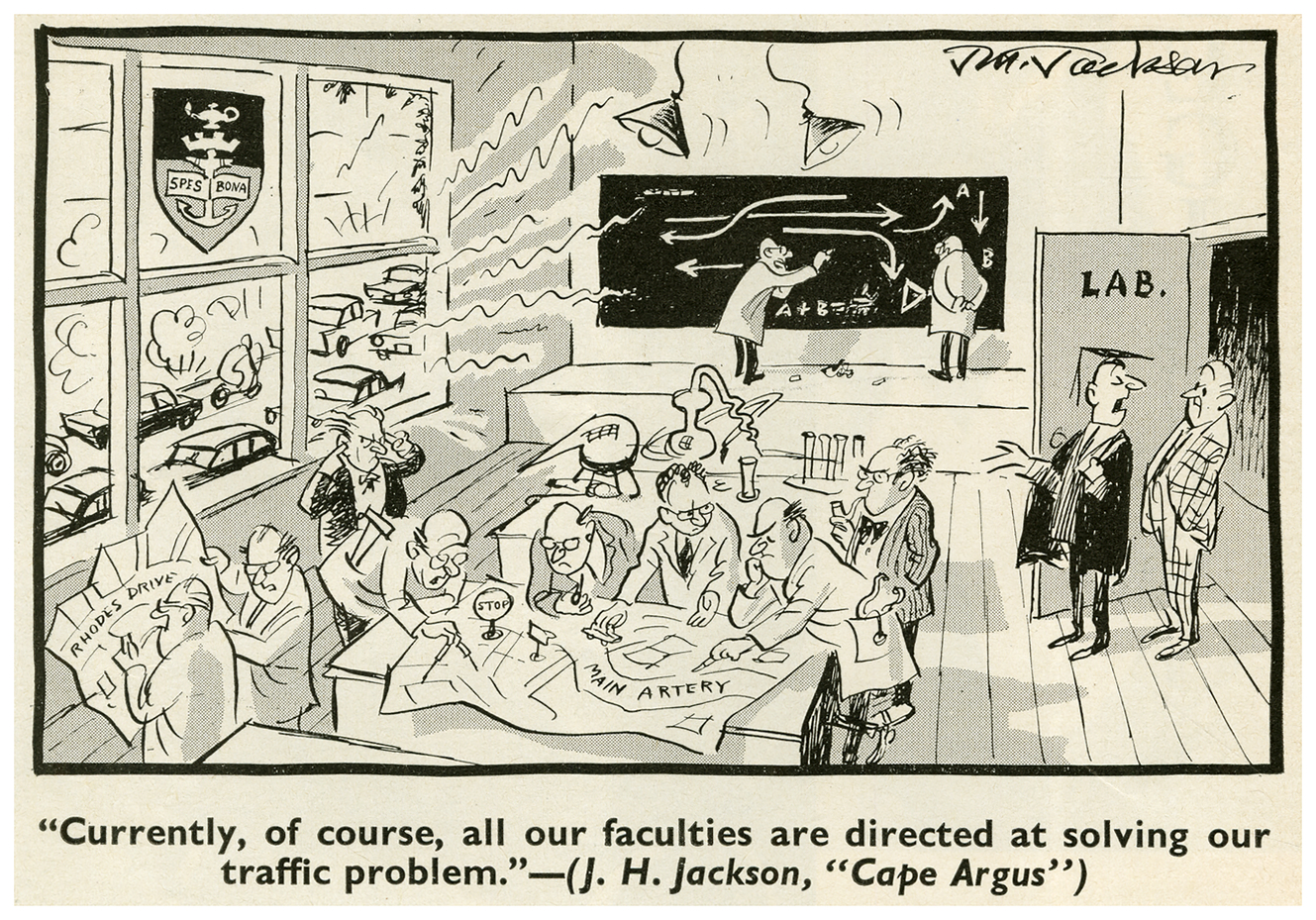
Academia
In the pure sciences, Botany is strongly represented by the records of the Bolus Herbarium itself, and the papers of Ted and Sybella Schelpe, and other UCT botanists. Special Collections also has the archive of the work of William Talbot, first Professor of Geography (1936-1974) as well as the enormous map collection he developed for teaching purposes, many of which are now accessible online. It is fascinating to note that when the Department moved to the Beattie Building in 1965, the whole top floor had to be reinforced to carry the weight of the collection! There are also records of the Department of Oceanography’s research vessel, the TB Davie, acquired in 1966.
In the applied sciences, Medicine is represented, e.g. in the papers of Prof Christiaan Neethling Barnard, Director of Surgical Research, whose work, and especially the first heart transplant in 1967, focused world attention on Groote Schuur Hospital; and the papers of Professor John Brock, Professor of Medicine, 1938-1970. There is a small collection of the papers of Lynn Gillis, first Professor of Psychiatry from 1962, while another collection relating to Arthur Bull and the Department of Anaesthesia of which he was the first professor from 1965, has recently been acquired.
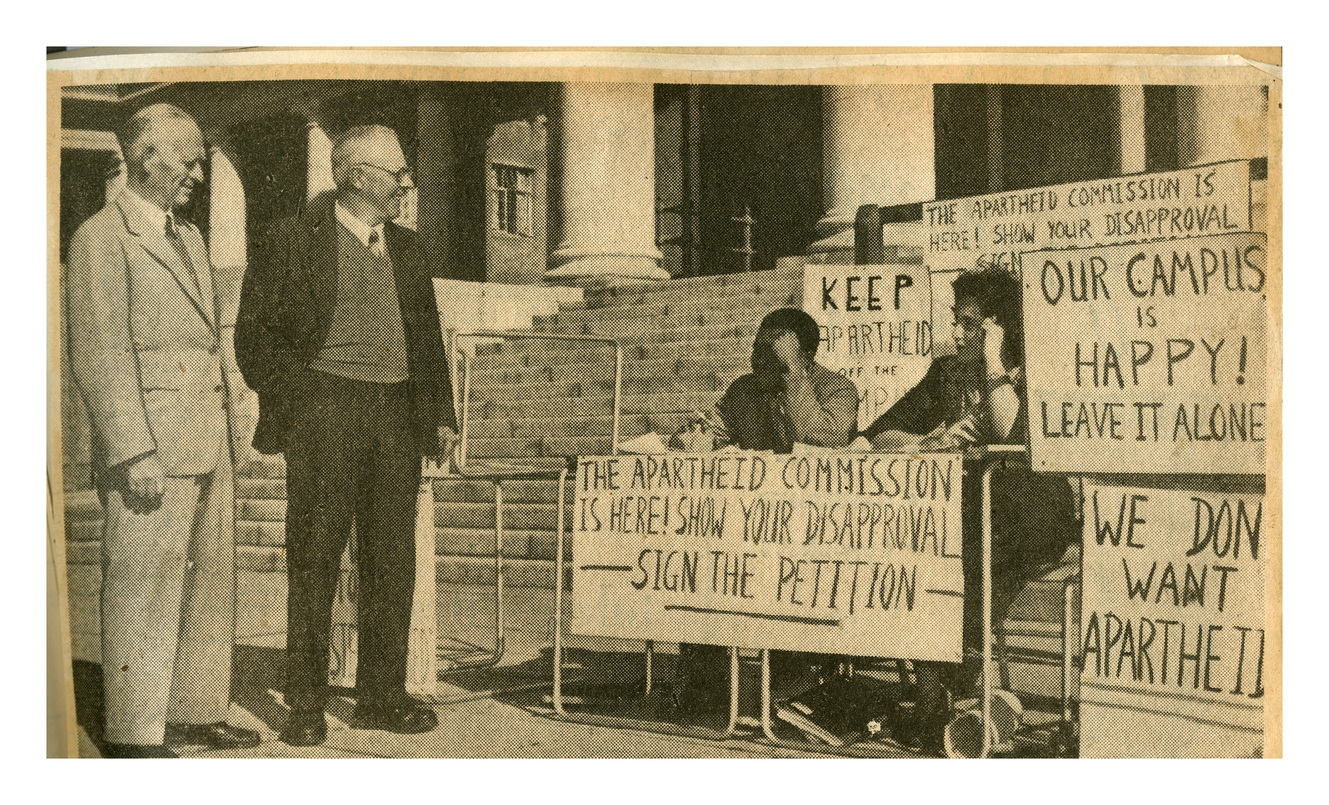
Some professional faculties are well represented. Special Collections has the archive of UCT’s Graduate School of Business, established in 1966. The papers of Denis Cowen, Professor of Comparative Law (1946-1961) have recently been donated. The papers reflect Cowen’s role as legal advisor to VC Davie on opposing the 1950s legislation on segregation in tertiary education, and the epic legal struggle to oppose the removal of Coloured voters from common voters’ roll, of which he was part. Architecture is represented e.g. in the papers of Professors Leonard Thornton White, Owen Pryce-Lewis and Roelof Uytenbogaardt. Various other architectural collections reflect UCT buildings of this period, e.g. Brian Mansergh (Bremner Building) and Jack Barnett (College of Music and later, the Baxter Theatre).
The arts are particularly well represented. In music, Special Collections has the extensive papers as well as the compositions of Prof Erik Chisholm, Director of the SA College of Music (1946-1965); records of the work of the Director of Opera in the College, Gregorio Fiasconaro (1948-1980); and the papers of the founder of UCT’s School of Ballet, Dulcie Howes, whose career spanned 1934-1973. In the fine arts, there are the papers and photograph collection of Neville Dubow, who was appointed at the Michaelis School of Fine Art in 1962, becoming chair from 1971; the papers and artworks of Katrine Harries, who lectured between 1949-1977; and the papers of sculptor Lippy Lipshitz, who taught from 1950.
History and economic history respectively are represented by the papers of Prof Eric Axelson, head of Department 1962-1975, Rodney Davenport and Sheila van der Horst. In philosophy, there are the papers of Prof Andrew Murray, head of department 1937-1970, and his successor, Martin Versfeld, who had taught in the department since 1937.
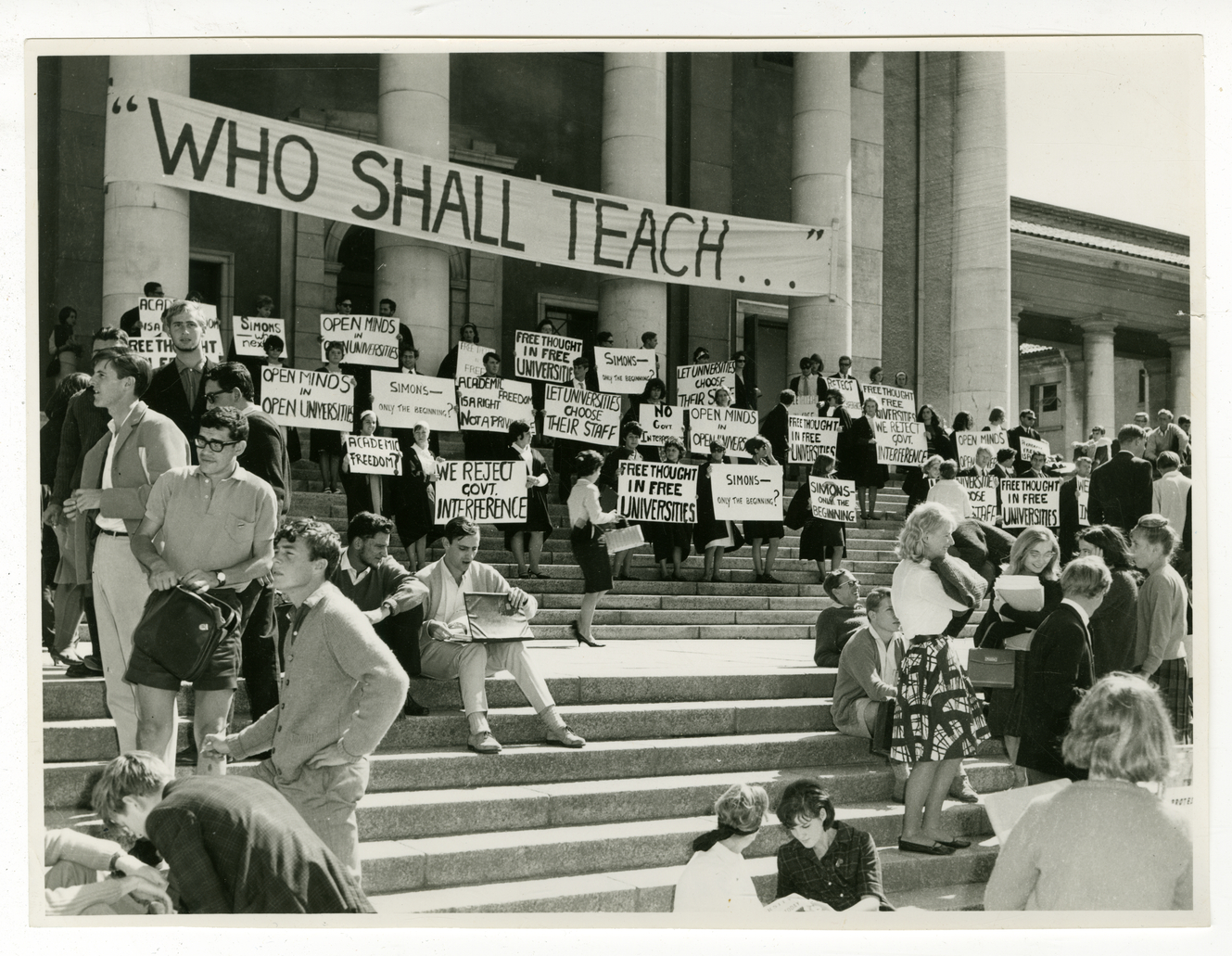
Two of the most extensively used collections emanated from the work of two scholars in the nominal School of African Studies. Monica Wilson, UCT’s first and only female professor in this period, was head of Social Anthropology between 1952-1973. She was to be acknowledged as a world-ranked anthropologist. Her mentee, Archie Mafeje, who helped with her study of Langa, would have taught in her department. “Monica Wilson used her lectures to open the eyes of her predominantly white students to the structure and functioning of African societies”. A sub-department, Comparative African Government and Law, was headed by Assoc Prof Jack Simons. When he was banned in 1965, he went into exile with his wife, trade unionist Ray Alexander. The Simons Papers contains the record of their work and of many liberation movements.
In African Languages, Special Collections holds the papers of Prof Gerald Lestrade, who was head of department between 1935-1962, as well as his successor, Prof Ernst Westphal. Westphal’s research and recordings on the non-Bantu languages are fully digitized and accessible online. Archaeology is represented by the research documented in the papers of John Goodwin, an expert in the stone age, who was head of department until 1959.
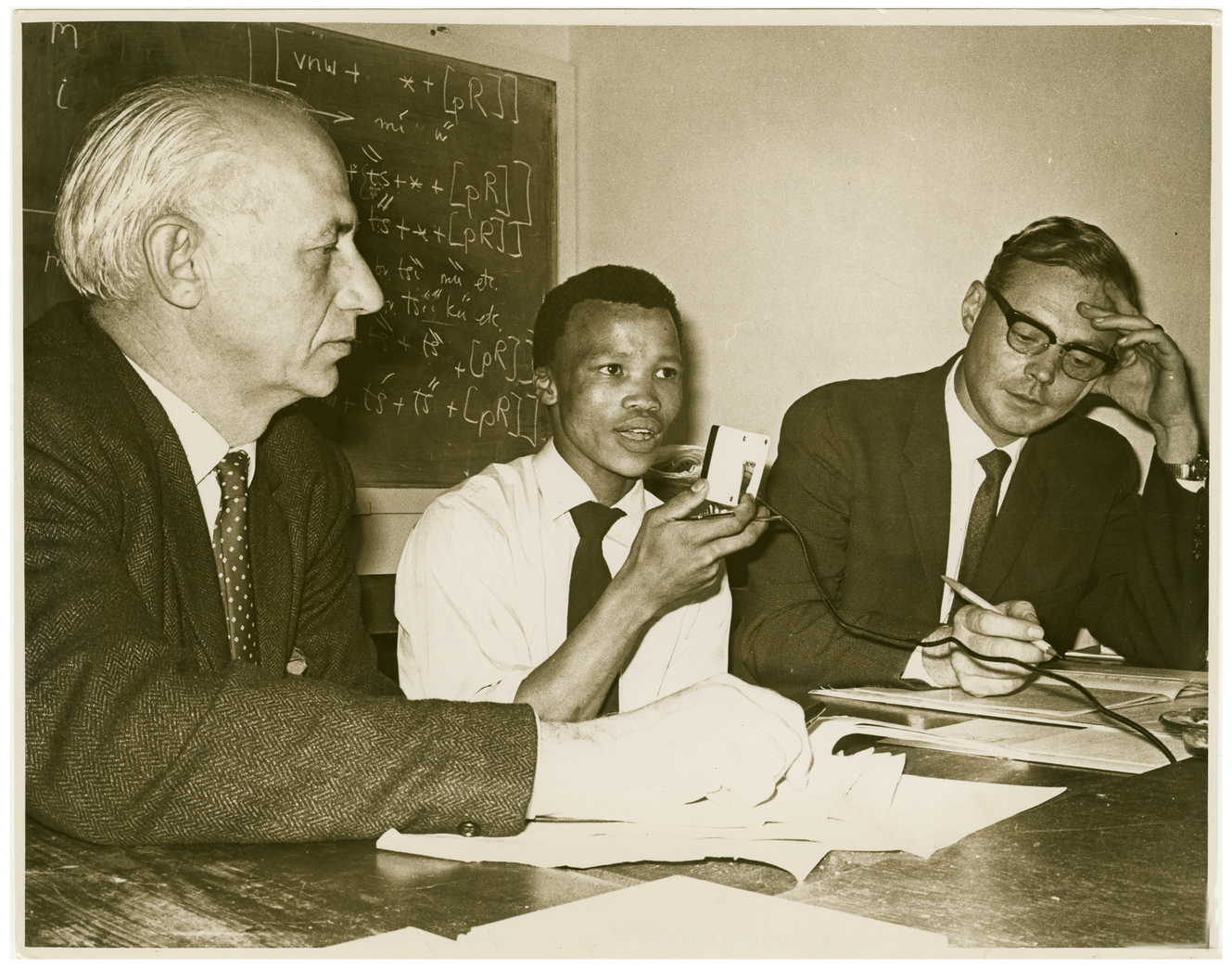
Outreach to the wider community and student activities
Special Collections holds the archive of UCT’s Department of Extra-Mural Affairs, 1949-1988, and the earliest records of the Students’ Health and Welfare Centres Organization (SHAWCO) founded in 1953 and through which medical students have since then run clinics in needy areas. There is also the extensive archive of the National Union of South African Students (NUSAS) in which UCT students were prominent. It was at the NUSAS Annual Day of Affirmation in 1966 held in Jameson Hall that Senator Bobby Kennedy delivered his “Ripple of Hope” address.
Conclusion
The richness of Special Collections’ archival holdings is illustrated by the foregoing examples which represent a selection of the collections relating to the period under discussion. It is a testimony to the endeavours of creators, donors and archival administrators who sought to preserve an archival legacy for the historical record and future research.
Note: The archival images in the blog were published in the book and the captions used in the article have mainly been copied.
